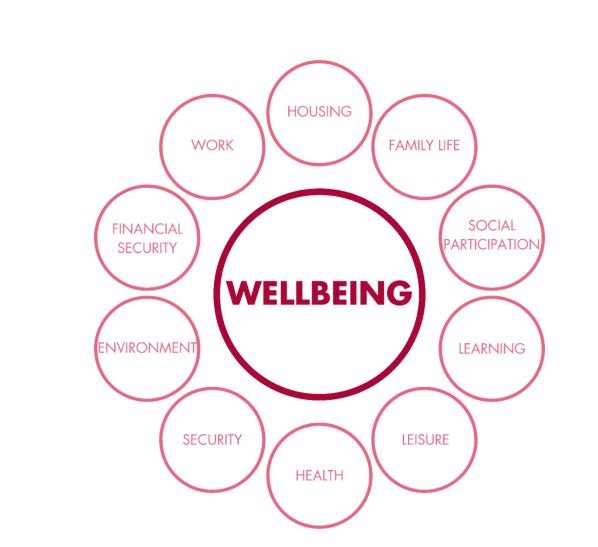I have been reading and writing a lot about wellbeing recently. It is not new to me but I seem to have a deeper understanding and relationship with the topic. When I left Parliament I wanted to pursue four major issues: International development, Sport and physical Activity Policy, Economic development AND Wellbeing policies.
As I spend more time working on these I realise now that Wellbeing is not a separate topic I want to pursue but the golden thread that runs through the others.
I have ‘known’ this for some time and have always tried to work outside my silos into a systems approach - but it isn’t always easy!
It is important that I set out what I mean by wellbeing, as it is often misunderstood. Either interpreted too narrowly into a ‘wellbeing programme’ at work or health club or dismissed as a little to wishy washy to be taken seriously alongside the work on happiness.
“Well-being is a major underlying driver of policy coherence across sectors and encourages galvanized action. Advancing societal well-being helps create active, resilient and sustainable communities at local, national and global levels, enabling them to respond to current and emerging health threats such as COVID-19 and environmental disasters.”
Of course it has been obvious to everyone else as you can see from this quote. I have complained about silo policy making and delivery yet here in my own pursuit of purpose I have been doing the same - compartmentalising the various aspects.
My early journey started with trying to find meaning in life beyond the accumulation of ‘stuff’ and the wider policy goal of happiness.
Fortunately I am not alone, Whole nations have grasped this notion and made it work.
So that’s where I have finally caught up. Why are the Scandinavian countries the happiest and healthiest places to live? The interconnection between health, poverty and inequality is a virtuous circle. We live in a country that has the opposite. Growing inequality, declining health and life expectancy and a nation that on any measure is pretty unhappy.
Wellbeing can be harder to define. According to the Oxford English Dictionary, it is
“the state of being healthy, happy or prosperous; physical, psychological, or moral welfare; a good or safe condition; an ability to flourish or prosper”. The Office for National Statistics defines it as “how we’re doing – as individuals, communities and as a nation – and how sustainable [this condition] is”. The Treasury’s Green Book calls it “social value
But I don’t want to get too caught up in the words and definition. I think we can instinctively know when we see humans flourishing and when we don’t. In the UK today too many of our fellow citizens are barely surviving never mind flourishing.
Tackling our ‘Stuff’ - My early entry to this debate
Reading from the 1990s and 2000s was about decluttering and finding meaning in health and wellbeing and Happiness.
So the idea is to spend all my time promoting wellbeing through my various interests, but in a much better joined up way. My sport and physical activity interests are about helping put more life into our years than year onto our life.
My inclusive economic development is about tackling inequalities and poverty so everyone shares from growth. My interest in sport and physical activity has never been a silo for me but as part of the health side of wellbeing policy.
NONE of this is new. Happiness and Wellbeing have been pursued as policy objectives for years and there are Institutes of Happiness. I guess my sole role in promoting this is to mainstream the ideas and delivery into the areas I have a little influence - policy and advocacy.
So below I have tried to capture as many of the resources and links that I can to help us along that journey.
Links to existing Resources
In this edition of Author Talks, McKinsey Global Publishing’s Molly Liebergall chats with Robert Waldinger, director of the Harvard Study of Adult Development, about his new book The Good Life: Lessons From the World’s Longest Scientific Study of Happiness (Simon & Schuster, January 2023), cowritten by Marc Schulz. After tracking thousands of people over the course of 85 years, the Harvard study has found the factor that correlates with good living: good relationships. Waldinger, the study’s current director, shares what the happiest (and unhappiest) participants had to say about regret and fulfillment and how to put their lessons into practice. An edited version of the conversation follows.
Author Talks: Robert Waldinger on "The Good Life" | McKinsey
A Wellbeing agenda requires much greater early intervention and prevention in policy making,
This report sets out why this is needed and what can be done to overcome the ‘blocks’
EarlyActionReport-A4_05final26July.pdf (civilexchange.org.uk)
Healthy Places
Healthy Places Report - Healthy Place
A Wellbeing agenda requires much greater early intervention and prevention in policy making,
This report sets out why this is needed and what can be done to overcome the ‘blocks’
EarlyActionReport-A4_05final26July.pdf (civilexchange.org.uk)
The Fabian Report by Kim Leadbetter MP
What is beyond doubt is that it is dependent on numerous interlinked aspects of our daily lives, from the environment to the workplace, and from housing to the ability to take physical exercise.1 It incorporates: • physical health and wellbeing • mental health and wellbeing • social health and wellbeing
Evidence based early intervention for wellbeing is not new. A good friend of mine Graham Allan MP took on this issue/ fight whilst in Parliament. There was real momentum at one stage but I fear ‘Austerity’ got in the way of making progress.
Have a look at these reports commissioned by Government and Parliament:
Evidence-based early-years intervention (parliament.uk)
Graham Allen launches second report on Early Intervention - GOV.UK (www.gov.uk)
Early Intervention: Smart Investment, Massive Savings (publishing.service.gov.uk)
Early Intervention: The Next Steps (publishing.service.gov.uk)
As you will see not a lot is new about our thinking at SajeImpact or the Sports Think Tank, but it is to give greater voice to the work and evidence that already exists.
World Happiness Report 2023
What Works wellebing
We are the UK’s independent body for wellbeing evidence, policy and practice Our work aims to accelerate research and democratise access to wellbeing evidence
demos - the preventative state
.
Make it stand out
Public services are facing an unsustainable rising tide of demand. In response, politicians across the political spectrum are calling for a greater shift to prevention in public services. This is necessary: public services today are too reactive, intervening too late. To address this we need to move from transactional public services to relational public services. Yet this essay argues that focusing on a new model for public services is necessary but insufficient, we need a state which is more expansive in how it sees the challenge of reforming public services. That’s because to truly reduce demand for public services in the long run, we need to not only prevent problems from arising, but create the conditions for flourishing and resilience within communities. Achieving this means investing in those foundational goods which create the social capital that enables us to lead better lives, without state intervention. Only then can a truly preventative state emerge Whatever it is, the way you tell your story online can make all the difference.






